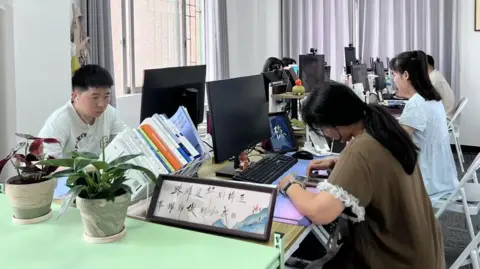BBC Information Chinese language, Hong Kong
 BBC
BBCNo-one would need to work with out getting a wage, and even worse – having to pay to be there.
But paying corporations so you’ll be able to faux to work for them has turn into standard amongst younger, unemployed adults in China. It has led to a rising variety of such suppliers.
The event comes amid China’s sluggish financial system and jobs market. Chinese language youth unemployment stays stubbornly excessive, at more than 14%.
With actual jobs more and more arduous to return by, some younger adults would slightly pay to enter an workplace than be simply caught at dwelling.
Shui Zhou, 30, had a meals enterprise enterprise that failed in 2024. In April of this 12 months, he began to pay 30 yuan ($4.20; £3.10) per day to enter a mock-up workplace run by a enterprise referred to as Fake To Work Firm, within the metropolis of Dongguan, 114 km (71 miles) north of Hong Kong.
There he joins 5 “colleagues” who’re doing the identical factor.
“I really feel very glad,” says Mr Zhou. “It is like we’re working collectively as a gaggle.”
Such operations are actually showing in main cities throughout China, together with Shenzhen, Shanghai, Nanjing, Wuhan, Chengdu, and Kunming. Extra usually they appear like fully-functional workplaces, and are outfitted with computer systems, web entry, assembly rooms, and tea rooms.
And slightly than attendees simply sitting round, they’ll use the computer systems to seek for jobs, or to attempt to launch their very own start-up companies. Generally the each day charge, normally between 30 and 50 yuan, contains lunch, snacks and drinks.

Dr Christian Yao, a senior lecturer at Victoria College of Wellington’s College of Administration in New Zealand, is an knowledgeable on the Chinese language financial system.
“The phenomenon of pretending to work is now quite common,” he says. “Attributable to financial transformation and the mismatch between training and the job market, younger individuals want these locations to consider their subsequent steps, or to do odd jobs as a transition.
“Fake workplace corporations are one of many transitional options.”
Mr Zhou got here throughout the Fake To Work Firm whereas searching social media website Xiaohongshu. He says he felt that the workplace setting would enhance his self-discipline. He has now been there for greater than three months.
Mr Zhou despatched images of the workplace to his mother and father, and he says they really feel way more relaxed about his lack of employment.
Whereas attendees can arrive and go away every time they need, Mr Zhou normally will get to the workplace between 8am and 9am. Generally he does not go away till 11pm, solely departing after the supervisor of the enterprise has left.
He provides that the opposite individuals there are actually like associates. He says that when somebody is busy, reminiscent of job searching, they work arduous, however once they have free time they chat, joke about, and play video games. They usually usually have dinner collectively after work.
Mr Zhou says that he likes this crew constructing, and that he’s a lot happier than earlier than he joined.
In Shanghai, Xiaowen Tang rented a workstation at a faux work firm in Shanghai for a month earlier this 12 months. The 23-year-old graduated from college final 12 months and hasn’t discovered a full-time job but.
Her college has an unwritten rule that college students should signal an employment contract or present proof of internship inside one 12 months of commencement; in any other case, they will not obtain a diploma.
She despatched the workplace scene to the varsity as proof of her internship. In actuality, she paid the each day charge, and sat within the workplace writing on-line novels to earn some pocket cash.
“If you are going to faux it, simply faux it to the tip,” says Ms Tang.
Dr Biao Xiang, director of the Max Planck Institute for Social Anthropology in Germany, says that China’s pretending to work pattern comes from a “sense of frustration and powerlessness” concerning a scarcity of job alternatives.
“Pretending to work is a shell that younger individuals discover for themselves, making a slight distance from mainstream society and giving themselves slightly house.”
The proprietor of the Fake To Work Firm within the metropolis of Dongguan is 30-year-old Feiyu (a pseudonym). “What I am promoting is not a workstation, however the dignity of not being a ineffective individual,” he says.
He himself has been unemployed up to now, after a earlier retail enterprise that he owned needed to shut through the Covid pandemic. “I used to be very depressed and a bit self-destructive,” he remembers. “You wished to show the tide, however you have been powerless.”
In April of this 12 months he began to promote Fake To Work, and inside a month all of the workstations have been full. Would-be new joiners have to use.
Feiyu say that 40% of consumers are current college graduates who come to take images to show their internship expertise to their former tutors. Whereas a small variety of them come to assist take care of strain from their mother and father.
The opposite 60% are freelancers, lots of whom are digital nomads, together with these working for giant ecommerce companies, and our on-line world writers. The common age is round 30, with the youngest being 25.

Formally, these employees are known as “versatile employment professionals”, a grouping that additionally contains ride-hailing and trucker drivers.
Over the long term Feiyu says it’s questionable whether or not the enterprise will stay worthwhile. As an alternative he likes to view it extra as a social experiment.
“It makes use of lies to take care of respectability, nevertheless it permits some individuals to search out the reality,” he says. “If we solely assist customers lengthen their appearing abilities we’re complicit in a delicate deception.
“Solely by serving to them rework their faux office into an actual start line can this social experiment actually stay as much as its promise.”
Mr Zhou is now spending most of his time bettering his AI abilities. He says he is observed that some corporations are specifying proficiency in AI instruments when recruiting. So he thinks gaining such AI abilities “will make it simpler” for him to discover a full-time job.
